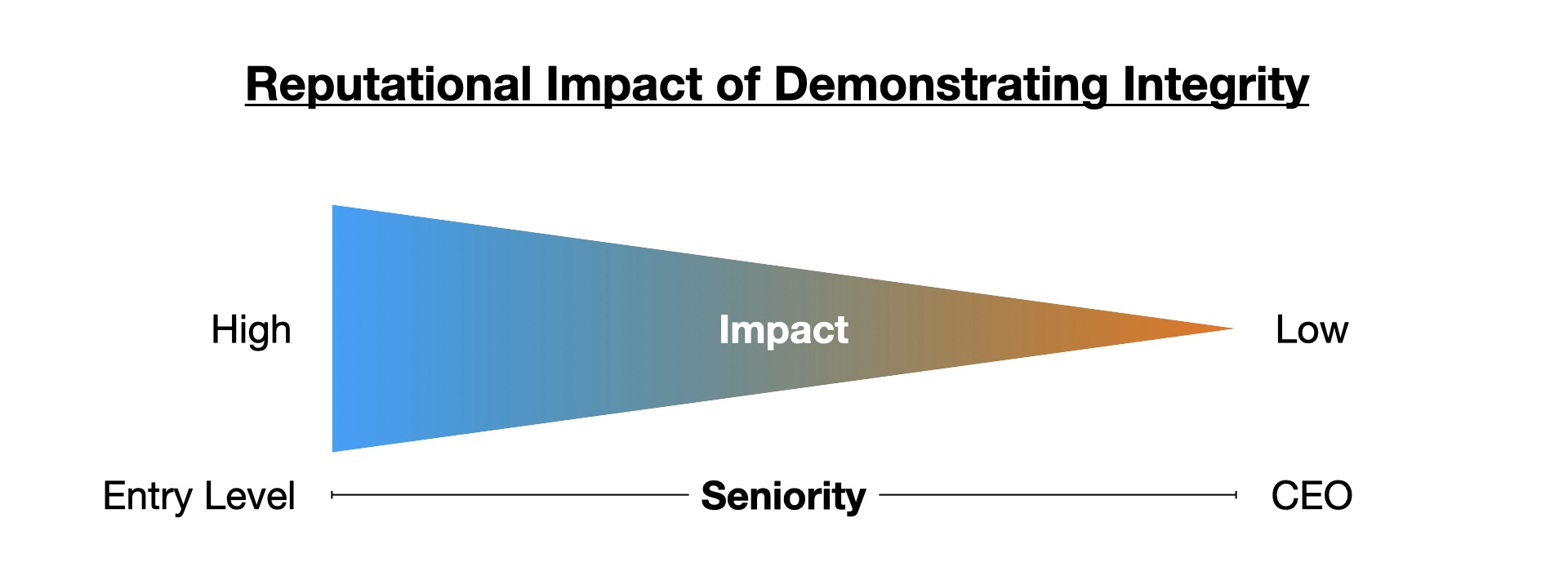The Last Two Weeks
⏲ 5-minute read | last updated 1 year, 1 month ago

The last two weeks of your job have as much impact on your reputation as the preceding two years. Given this, if you are leaving a company it’s in your best interest to treat this time with the utmost care and attention1.
This remains true even if:
- You were treated poorly.
- You had a bad boss.
- You didn't get the promotion.
- Your job was very demanding and required more than 40 hours/week.
- ...and any other number of reasons you may be quitting.
A simple formula at work here makes extra care and attention during the last two weeks a no-brainer (even for self-serving types). Strictly from a cost-benefit ratio, there is no better time to add value to your reputation. It costs you almost nothing (the cost of continuing to perform your job normally) but could have tremendous benefits for you in the future.
Changed Incentives
Absent of specific rules or guidelines, humans tend to get away with what they can. Like supply-and-demand market forces, a natural equilibrium forms in most employment situations. The standard scenario is:
- Your employer has hired you to do a job.
- You need to perform your job (more or less) satisfactorily.
- If you dip too far below "satisfactorily", you get fired.
The satisfactory cutoff varies from job to job, month to month, and industry to industry; but, everyone understands these elements of the game. Your company is trying to manage its costs (not pay you too much), and maximize its revenue (get you to do the most for what you're being paid). As the worker, for you the reverse is true. Naturally, we reach an equilibrium of expected performance for a given salary.
When you resign, this changes. Suddenly, there’s little incentive for you to do your job.
- If you don’t perform your work, it doesn’t matter because it would take longer to fire you than the two weeks that will elapse before you leave.
- Which means you can perform or not perform at your discretion.
- Regardless of your performance, your employer will still need to replace you and someone else will handle what you don't get to.
Demonstrating Integrity
Because of the changed incentives above, if you do keep doing your job and don’t take advantage of the situation, you're no longer doing it because market forces demand it. You're doing it for some other reason, and others will see it as a display of integrity. Even though you could get away with doing less with minimal repercussions, you don’t.
In a way, this is like a Mario cart boost to every interaction you have, because now you’re doing your normal thing (demonstrating competence and proficiency at your job), but also doing another thing on top of that (giving surplus time and attention when it’s not explicitly incentivized, demonstrating integrity).
Giving up on your job when you submit your resignation is like running a marathon and deciding to walk 1/4 mile from the finish line. Not because you ran out of energy, but because you're "close enough" - it just doesn't make any logical sense.
Intangible Benefits
If you don't want to think about this in a moral/altruistic way, there's a selfish argument for performing your best, too:
- It keeps the door open to returning to the company.
- It makes networking with your old coworkers easier.
- There's a non-zero chance you need some advice from them in the future that they're more likely to give you.
- Many-a-freelancing gigs have been created by maintaining good relationships with former employers who can't find someone to replace you and are in a pinch for help.
All this for the low price of continuing to perform your job to the best of your ability up to your last day. Easy!
The Higher You Go
The more senior your role the more this behavior is expected. At higher levels (with direct reports and/or greater scope), integrity becomes an increasingly important element of being hired for the role in the first place. It's a built-in expectation.

Two considerations with this:
- If you're early on in your career - there's a lot to gain by demonstrating integrity.
- If you're late in your career, there's a lot to lose by failing to demonstrate it.
Know Your Line
After your last day, your obligations to your former company stop. While it's always considerate to answer the occasional question (where did you keep that file, what was your main contact's email), boundaries demonstrate integrity, too. Your specific boundaries depend on your industry and coworker relationships, but the advice here is to draw your line clearly for yourself and others after your last day. Don't be afraid to be consistent and enforce it.
Take Advantage
You only get a few occasions to switch jobs in your career. Especially early on, these events create a rare opportunity to accelerate your professional life and to serve others while also make you feel really good about yourself. Take advantage of it.
Separately, in general, you should always be quitting your job.↩